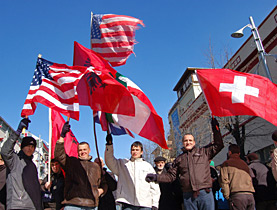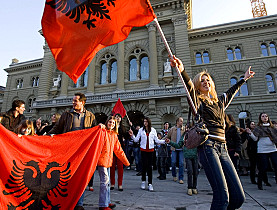Kosovo’s independence meets mixed response

The Swiss press has reacted with caution to the independence declaration of Serbia's breakaway republic of Kosovo.
European Union member countries are considering a response to Sunday’s move, while the United Nations Security Council failed to agree on a common stance.
The Zurich-based Tages-Anzeiger newspaper describes Kosovo’s decision as a baptism of fire and the birth of a new European nation as somewhat flawed.
“The enthusiasm of the Kosovars might be huge, but it is rather limited in the rest of Europe. Indeed it would have been better to avoid a split… It could set a precedent for further secession drives by other ethnic minorities.”
However, the editorial points out that there was no choice for Kosovo given its history with Serbia. It adds that the EU faces the difficult task of implementing its good advice for the new state.
In a similar vein, the French-language Le Temps paper says it is “independence with multiple unknown factors.”
“Is the independence declaration the logical consequence of the conflict in 1999? Will it trigger more calls for independence in the powder keg of the Balkans?” Le Temps adds Sunday’s independence declaration was the result of a political process.
The editorial in the prestigious Neue Zürcher Zeitung newspaper says the independence of Kosovo offers Serbia an opportunity for a fresh start, despite the loss of part of its territory.
“Belgrade could finally put behind its disastrous fixation on the national issue and break with the heritage of the rule of Slobodan Milosevic.”
The Basler Zeitung warns that the new state will only be truly valid if Serbia and Kosovo reconcile with each other.
For its part, the Bern-based Der Bund says the only hope for the time being is for Serbia to get to grips with the new reality and stop looking back. It adds that the country has to decide whether it wants to belong to Europe or to seek refuge under the wings of Russia.
Security Council
In a related development, the UN Security Council has failed to agree on a plan for Kosovo, but western countries said the EU and Nato should take responsibility for the region’s stability.
An emergency council meeting in New York on Sunday was unable to heal the differences between Serbia’s ally Russia, which said the independence declaration was illegal, and western states. They maintain that Kosovo’s independence is the only viable option after talks failed.
But most of the EU’s 27 members are expected to recognise Kosovo and underwrite it with a 2,000-strong rule-of-law mission to take over supervision of the new state from the UN.
Switzerland, which is not an EU member, will decide in the near future whether to recognise Kosovo’s independence. The Swiss foreign minister, Micheline Calmy-Rey, has reiterated Switzerland’s support for the Kosovo.
She said the issue of recognising the state would be decided after parliamentary committees discussed it.
swissinfo, Urs Geiser
Switzerland is home to 200,000 of the Kosovar diaspora – the second-largest immigrant community after Italians.
300,000 people in Switzerland come from the former Yugoslavia.
Switzerland has some 200 troops stationed in Kosovo since 1999.
The foreign ministry said it could send up to 20 policemen and legal experts as part of the EU mission in Kosovo.
The Swiss government’s development agency (SDC) has earmarked SFr13.9 million ($12.7 million) for aid in Kosovo in 2008.

In compliance with the JTI standards
More: SWI swissinfo.ch certified by the Journalism Trust Initiative


You can find an overview of ongoing debates with our journalists here . Please join us!
If you want to start a conversation about a topic raised in this article or want to report factual errors, email us at english@swissinfo.ch.